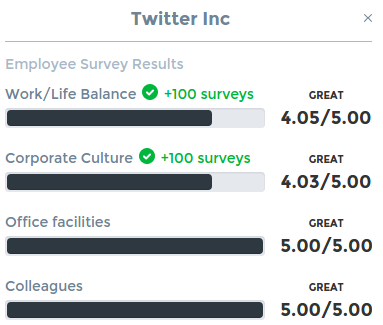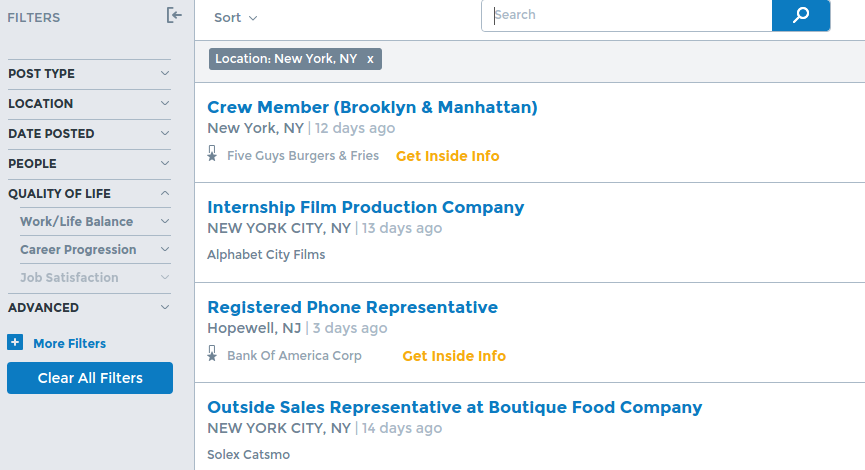Job hunting? This startup can tell you what it's really like to work at that company
From The Idea Factory, our special report on innovation


A free daily email with the biggest news stories of the day – and the best features from TheWeek.com
You are now subscribed
Your newsletter sign-up was successful
What do you look for in a job?
A decent salary is probably at the top of your checklist. But as many people know all too well, just because a job pays well doesn't mean it's enjoyable. In fact, according to Gallup, a whopping 70 percent of Americans are unhappy and disengaged at work.
Part of the problem for job seekers is that unless you know someone on the inside, it's nearly impossible to get an honest idea of what it's actually like to work for a company. It could look good on paper but be dysfunctional in reality. Morale could be low, company culture could be stifling, and the potential for work-life balance non-existent.
The Week
Escape your echo chamber. Get the facts behind the news, plus analysis from multiple perspectives.

Sign up for The Week's Free Newsletters
From our morning news briefing to a weekly Good News Newsletter, get the best of The Week delivered directly to your inbox.
From our morning news briefing to a weekly Good News Newsletter, get the best of The Week delivered directly to your inbox.
"A lot of companies pour millions of dollars into branding and brand-building and oftentimes that creates noise around the true state of the company," says Anthony Van Horne, a former Goldman Sachs employee and NYU adjunct professor. After seeing his students agonize over finding a good career fit, he set out to find an innovative solution. So Vane Horne created CareerLabs, a job search engine that harnesses data to pull back the curtain on the reality of a company's culture.
Here's how it works: CareerLabs collects millions of data points and employee surveys from sources like the Securities and Exchange Commission, the Bureau of Labor Statistics, and the Financial Industry Regulatory Authority to create a snapshot of a company's financial health, benefits, gender distribution, and even political affiliation. "It's like Carfax for your job search," Van Horne says. The site tracks more than 22 million companies, both private and public. The basic service is free, but $19 a month gets you information on whether a company will sponsor visas, and $49 a month gives you insights into a company's growth rate.

When I gave CareerLabs a spin, the site surfaced hundreds of job openings and told me people who work for American Express report a great corporate culture and the New York Public Library has an underwhelming rating when it comes to colleagues and office facilities. Van Horne says the site's most popular filter is work-life balance. "I think so many employees can relate to the experience of joining a company with a certain level of expectation only later to find out the environment is the complete opposite of what they were looking," he says.
Of course, a site like CareerLabs really only works when the job market is booming and we have the luxury of looking for a job that not only pays the bills, but fits our personality. But this may be a good time to launch such a product, because as Lydia Dishman at Fast Company points out, there are twice as many employers looking to fill jobs as there are applicants.
A free daily email with the biggest news stories of the day – and the best features from TheWeek.com

The kind of transparency CareerLabs is offering could be great for job hunters, but no doubt, some companies are bristling at the thought of having their flaws exposed. Van Horne stresses that the site controls for outliers like disgruntled employees. "We're not at all interested in providing one point of view," he says. "Let's say an employee is on the extreme either way. If there are not enough employees to submit perspectives also, we are not in the business of publishing that perspective because its not statistically relevant. At the end of the day it's just math."
Still, a few important statistics are missing from CareerLabs, says Caroline O'Donovan at BuzzFeed, like "diversity numbers, or demographic info on their workforce — which would be helpful if you don't, for example, want to be the only black woman or gay guy in the office." But, she says, "if CareerLabs is successful, it'll make a previously opaque process a little easier."
Jessica Hullinger is a writer and former deputy editor of The Week Digital. Originally from the American Midwest, she completed a degree in journalism at Indiana University Bloomington before relocating to New York City, where she pursued a career in media. After joining The Week as an intern in 2010, she served as the title’s audience development manager, senior editor and deputy editor, as well as a regular guest on “The Week Unwrapped” podcast. Her writing has featured in other publications including Popular Science, Fast Company, Fortune, and Self magazine, and she loves covering science and climate-related issues.
